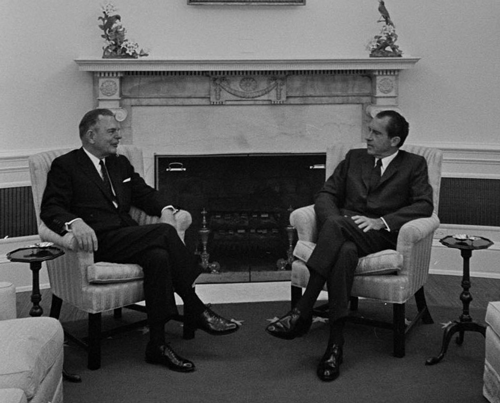Once again, Watergate analogies are in the air. Though they may be overdrawn, there are important lessons that remain evergreen from a historic, catastrophic leadership breakdown at highest level. These lessons are as familiar as Shakespeare or the Bible—and as pertinent as ever in the new world of 21st century leadership.
One major change: the rapid denouement of the Nixon presidency—from electoral triumph to dissolution in less than two years—would be greatly accelerated in today’s Internet age.
10 Watergate Leadership Lessons
1. Uphold the Highest Ethical Standards. This sounds so obvious as to be unnecessary to say—but is it? In the heat of competition or conflict, it’s easy to slide toward an ends-justify-the-means mentality. Richard Nixon could rationalize any number of misdeeds, pointing to numerous ethical lapses by prior presidents or political opponents. Nonetheless, a president is held to uniquely high standards when the stakes are high. For the same reason, the Constitution authorizes impeachment for “high crimes and misdemeanors.”
2. Demand Integrity. The initial releases of parts of the Nixon tapes were shocking in part because of the huge disjunction between Nixon’s private behavior and his public self-righteousness toward others’ lapses (including his public scolding of a prior president for using profanity). The lack of alignment of values and conduct was so pronounced that Nixon, and the organization he led, lacked integrity in the true sense of wholeness.

3. Toxic Culture. It appears that Richard Nixon may not have known in advance, much less ordered the break-in of the Democratic National Committee headquarters in the Watergate complex that lit the fuse on the scandal. What is clear is that Nixon had created a toxic culture in the organizations of which he was the hub: the White House, the Republican National Committee, the Committee to Re-elect the President, and various executive branch agencies. If Nixon deserves credit for the good things that his administration accomplished, it must be recognized that he is accountable for the toxic culture as well. A paradox of high positional leadership is that the greater one’s influence—and ambition—the more that one also becomes a spectator to ensuing consequences. This is captured masterfully in Thomas Mallon’s memorable novel, Watergate. In the end, the bad that Nixon set loose overwhelmed the good, with fearsome collateral damage.
4. Don’t Allow Your Preferences to Override the Priorities of Those You Serve. For reasons ranging from temperament to principle, presidents tend to have distinct preferences in their allocation of time and attention. Richard Nixon’s great focus was international affairs. This was apt for the precarious circumstances the United States found itself in when he assumed the presidency in 1969. Nixon’s deep understanding of executive branch management and congressional affairs enabled him to effectively delegate key issues to the daily attention of aides such as John Ehrlichman, whose work was instrumental to the founding of U.S. Environmental Protection Agency. Nixon’s personal attention to foreign affairs need not have resulted in neglect of domestic affairs—but it did. This was a fatal flaw when the nation was rent by political division and civil disobedience.
5. Hazards of Delegation. The greater the degree of delegation, the more important accountability becomes. Delegation does not mean abdication. Nixon’s expansive delegation occasioned some serious spots of vulnerability. His politics did not constitute, in the eyes of many, a clear vision. As a result, his policies were often situation-specific and complex. Those charged with implementing them might well be forgiven for coming up with varied interpretations of their mandate. Accountability was also attenuated by Nixon’s tendency to give “orders” that his top staff would selectively disregard in an effort to protect their boss from his own worst instincts.
6. Inconsistent Personnel Practices. Nixon’s personnel practices were inconsistent. On the positive side of the ledger, his administration included many people of notable talent. They ranged from Daniel Patrick Moynihan to Donald Rumsfeld to Elliot Richardson to George Shultz to William Ruckelshaus, and many more. At the junior staff level, talents as diverse as Henry Poulson, Tom Peters, and Dick Blumenthal could be found. On the negative side, there were many whose governmental performance was mediocre at best. Curiously for one whose national electoral viability derived from his service as a two-term vice president, Nixon selected mountebank Spiro Agnew as his second-in-command and putative successor.
7. Tend to Relationships. It’s an understatement to say that Richard Nixon did not tend to relationships. He had few truly close political friends and allies to whom he could turn when crisis erupted. The lack of relationships was a dangerous self-indulgence for a president who was determined to make major changes in American government and politics. His relentless self-absorption was also seen in his incapacity to create a cadre of rising stars who would be united by their shared experiences in his administration. It’s telling that he reportedly never saw or reached out to his two top aides, H.R. Haldeman and John Ehrlichman, after they all were driven from public life.
8. Isolation is Lethal. President Nixon was a determined loner. His writings suggest an identification with a certain kind of mythic, heroic, “great man” leadership. That he and Charles de Gaulle had an affinity is likely not surprising. While retreating to the Old Executive Office Building and sketching thoughts on yellow pads was doubtless useful, it came to represent a broader isolation. When a path is clear, and the issue is simply execution, such isolation might well be effective. On the other hand, when the path is unclear, when events are fluid, when relationships are implicated…. in all these situations judgment is called upon. For a positional leader not to inform his judgment with the best thinking of others can be dangerous. So it was for Nixon. Some of his fateful decisions appear to have been the result of over-reliance on his own judgment, impaired in various ways.

9. Seed Your Ecosystem. Richard Nixon was an intelligent individual. Unfortunately, his estimation of his own abilities, combined with his lack of trust in others, rendered him bereft of an inner circle of elders or others of stature who could provide him much-needed perspective. He’s not the only president to fall into this trap. When no one can force one to listen to anyone—and no one can force a president of the United States—one better have the mother-wit to make certain that one’s reaching out for the best advice on offer. Former president Herbert Hoover had played an important role in Nixon’s wrenching decision not to challenge the razor-thin margin of the 1960 presidential election. Hoover had died in 1964. Dwight Eisenhower, whom Nixon served as vice president, died in 1969. Thomas Dewey—noted prosecutor, former governor of New York, Republican presidential nominee in 1944 and 1948, lawyer-statesman—played a key role in boosting and supporting Nixon’s career at various hinge moments. Several Nixon supporters, concerned about what they saw as dysfunction in the White House staff operations, urged Dewey to speak with the president directly, as only he could do. The man who had convicted Lucky Luciano and held Franklin Roosevelt to his closest presidential election margin would not have been intimidated by the Oval Office, much less the sitting president who owed so much to his patronage. By a quirk of fate, Dewey died unexpectedly of a massive heart attack on March 16, 1971. He was scheduled to be with Nixon that evening.
10. Character Matters. President Nixon undertook what most political leaders would consider an unenviable task: to govern effectively while reconciling his party and coalition to the dialogue and vision imposed by the political opposition. Nixon operated within the long shadow of American politics as reconfigured by Franklin Roosevelt. This necessity would call upon a capacity for guile and compartmentalization, at least in his case. So, too, he was operating within the oppressive realities of the Cold War world. Amorality was often excused as “realism.” These circumstances, along with Nixon’s undoubted electoral effectiveness, enabled too many people to overcome their well-founded qualms about his unsteady character. Years later, one prominent Nixon ally confided to me, shaking his head ruefully, that the thirty-seventh president suffered from “fundamental derangements.” That may be an overstatement based on hindsight—or not—but Richard Nixon’s character was his fate—and ours.
10 Watergate Leadership Lessons
